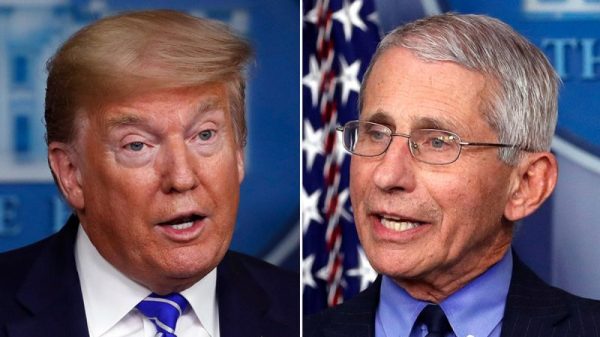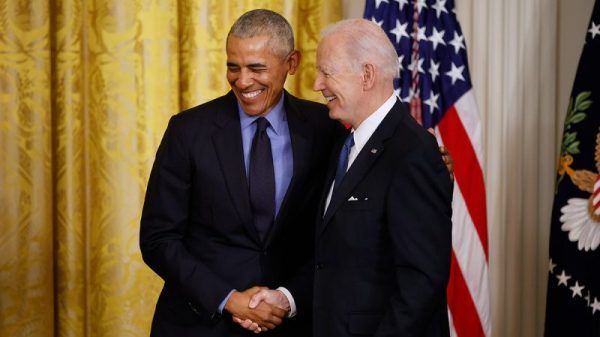The fate of an obscure provision of President Donald Trump’s 2017 tax package, which will be reviewed by the Supreme Court next week, has many experts panicked over the potential to destabilize the nation’s tax system. In addition, some say the outcome could preemptively block Congress from creating a wealth tax.
But the case has also exposed questions about the accuracy of the personal story a Washington State couple presented to the court in making their constitutional challenge to the tax, a one-time levy on offshore earnings.
Charles and Kathleen Moore appear to have closer ties to the company central to the case than they disclosed in court filings. Among other things, Charles Moore served on its board for five years and made a significant cash contribution to the company, records show.
Legal advocacy groups often rely on individuals to humanize their efforts in court, and it is not the first time that those on the other side have pointed to inconsistencies between what the justices are told in filings and the realities outside the courtroom.
This time, however, questions about the legal basis for the couple’s challenge to the tax have been raised before the justices are scheduled to hear oral argument on Dec. 5. Advocates who oppose their challenge have asked the Supreme Court to ditch the case and urged the couple’s attorneys, who come from an anti-regulatory advocacy group, to correct what they say are omissions and misstatements in the record.
Mindy Herzfeld, a tax policy expert from the University of Florida who has written extensively about the case known as Moore v. United States, said the court should not decide a constitutional question based on “an inaccurate set of facts.” To do so, she wrote in a recent column in Tax Notes, “risks undermining the Court’s legitimacy and creating the impression that its docket and its decisions are too easily manipulated by politically motivated interest groups.”
Dan Greenberg, an attorney for the Moores and general counsel of the Competitive Enterprise Institute, said in a statement: “I’m confident that our filings are candid and accurate.”
Adding to the tension are calls from Democratic lawmakers for Justice Samuel A. Alito Jr. to recuse himself from deliberations in the closely watched case, because of his ties to another member of the Moore’s legal team. Alito rejected those suggestions, saying he and that lawyer have not discussed the case.
The justices are being asked to decide whether a tax on offshore earnings that helped fund Trump’s massive tax cut is permitted under the limited powers of taxation that the Constitution grants to Congress. Activists behind the case believe a ruling in their favor could preemptively bar other taxes that Congress has not previously tried to impose, including a tax on wealth that Sen. Elizabeth Warren (D-Mass.) and others on the left have pushed as an equitable way to generate new funds for government spending.
An unusual political coalition has come together to defend the offshore-earnings tax, from the Biden administration to conservatives including former House Speaker Paul D. Ryan. Not because they favor a wealth tax, but because they worry a ruling against one little-known provision could undermine vast swaths of existing taxes on investments, partnerships and foreign income, which together raise billions or even trillions in revenue.
“A lot of the tax code would be unconstitutional if that thing prevailed,” Ryan said about the case at a recent Brookings Institution event. “I’m not for a wealth tax, but I think if you use this as the argument to spike a wealth tax, you’re going to basically get rid of, I don’t know, a third of the tax code.”
The court could also devise a narrow ruling that only applies to a few tax situations.
The Moores were subject to $15,000 in taxes due to the 2017 law, springing from investments they had made in a company based in India. The law created a one-time tax on certain offshore earnings that had previously been exempt from taxation unless the taxpayer brought the money back to the United States.
The Moores argue they never earned any money from their investment and sued the federal government seeking a refund. The District Court dismissed their case, and the U.S. Court of Appeals for the 9th Circuit upheld that decision, saying the tax was within Congress’s power and permitted under the Sixteenth Amendment regardless of whether the Moores took in, or “realized,” any income.
The appeals court quoted an earlier Supreme Court opinion to say that a taxpayer is not entitled to “‘escape taxation because he did not actually receive the money.’”
The specific tax that the Moores object to paying, known as Section 965, was forecast to raise more than $300 billion over 10 years. Some major corporations have already paid billions under this specific tax; a ruling that struck it down entirely might mean the government has to issue tens of billions of dollars in refunds.
And conceivably, the effects could ripple out much further. The Tax Foundation calculated that ending the taxation of all earnings retained in partnerships would cost the United States government more than $3 trillion over the next 10 years.
In Supreme Court filings and a video interview of the couple prepared by their legal team, the Moores describe making a $40,000 investment in 2006 in the new company of their friend, Ravindra Kumar Agrawal, whom Charles met while working as a software engineer at Microsoft.
“That was a lot of money for us, but we believed in Ravi’s idea and wanted to support him and see it to fruition,” Charles Moore said. The business supplies power tools to small-scale farmers in India.
“During all these years, we weren’t getting any money, but we were really excited to be part of this company that was growing and reaching more and more people all over India,” Kathleen Moore said in the video interview, which was posted by the Competitive Enterprise Institute. “I would say that was the return on the investment.”
The Moores’ attorneys say in court filings that the couple were “without any role in KisanKraft’s management.” Charles Moore said in a 2020 statement submitted to the court that he “never received a distribution, dividend, or other payment from KisanKraft.”
But tax experts say the Moores were more involved in the company than they suggested. Information included in KisanKraft’s corporate filings, reviewed by The Washington Post and first reported by Tax Notes, show Charles Moore listed as a director of KisanKraft from April 2012 until March 2017. A company resolution announcing Moore’s departure from the board cites his contribution to the “welfare and growth of the company.”
In his sworn statement, Charles Moore says that he visited India to vacation and to tour the company and meet employees. He does not mention that he was a director and reimbursed for about $14,000 in travel expenses between 2014 and 2017.
Moore made a contribution of cash to the company of about $245,000 in 2014 and was repaid the next year with interest at 12 percent, records show. In 2019, after the lawsuit was filed, Moore sold about 20 percent of his holdings for close to $300,000, according to the records.
Herzfeld said Moore’s years on the board, additional investments in the company and sale of shares undermine the couple’s argument that they were passive investors with no control over company activities — and therefore should not be subject to the tax.
The group Patriotic Millionaires, which believes the tax is constitutional, told the justices in a letter last week that the “factual background presented to you is not remotely accurate.”
But there has been no indication that the alleged discrepancies will become an issue before oral arguments next week.
A spokesperson for the court said she did not know whether the letter would be reviewed by the justices. In general, correspondence from those who are not participants in a case are not posted on the court docket, which lists the official case records before the justices.
Though Herzfeld said in her column that the Solicitor General’s office, which will defend the tax on behalf of the U.S. government, could suggest the justices dismiss the case and return it to the lower court for further factual review, Solicitor General Elizabeth B. Prelogar has not raised concerns about the record with the court. A spokesperson for Prelogar declined to comment.
Professional conduct rules require attorneys to notify the court and correct the record if they learn that factual assertions were incorrect. But the Moores’ attorneys say the record they presented is accurate.
The couple had a connection to the Competitive Enterprise Institute long before the launch of their legal challenge. Charles Moore’s father, Thomas Moore, was a longtime CEI board member and member of President Ronald Reagan’s Council on Economic Advisers.
The potential conflict of interest in the case cited by Democratic lawmakers involves David B. Rivkin, a lawyer who is representing the Moores and who twice interviewed Alito for articles that appeared on the Wall Street Journal editorial page. Alito has dismissed calls for his recusal, saying that he and Rivkin never discussed any issue in the Moore case and that Rivkin’s involvement in the litigation was disclosed in the second article.
Tax lawyers and other experts with views on the case have generally fallen into three camps of opinion on what the Supreme Court should do.
One group, mostly conservatives, says that the couple was taxed on unrealized gains, and never took in any income from their investment in the Indian company. Taxing them on money they never actually had, this group argues, is outside of the limited powers of taxation that the Constitution grants to the federal government.
Thomas Berry, a Cato Institute attorney who wrote an amicus brief siding with the Moores, said a decision in their favor “would let Congress know how far is too far in taxing property and taxing wealth. … In the long run, that simply means Congress is less likely to make this mistake again and will know in the future that it can’t raise revenue through an unconstitutional wealth tax.”
A second group, mostly left-leaning, says that taxing unrealized gains is allowable under the Constitution, which was the opinion of the lower court that ruled earlier on the Moores’ case.
“There are tons of exceptions to a strict realization requirement, [and] not only that, but those exceptions to realization are really important to maintaining the integrity of our progressive income tax,” said Andy Weiner, a lawyer who wrote an amicus brief along with several tax professors defending the tax law. “If you strike down the mandatory repatriation tax because there’s no realization requirement, that is going to be a very powerful tool for taxpayers to challenge all sorts of laws in all sorts of contexts.”
And then there is the third school of thought on this case. This group, including both Republicans and Democrats, has doubts about the constitutionality of taxing unrealized gains — but says that’s not what happened to the Moores. The tax on the Moores was perfectly legal, they say, because it wasn’t a tax on unrealized gains at all.
“The Moores aren’t being taxed on the change in the value of their shares. They’re not being taxed on the price of their shares, which would be like a wealth tax. … What’s being taxed is actual earnings and profit,” said George Callas, who as a staffer for Ryan helped write the section of the 2017 tax law at issue in this case.
He and other experts who argue that the Moores weren’t taxed on unrealized gains liken the tax on the couple to others that Americans routinely pay. One significant example: When two or more people form a business partnership, they each pay some taxes on their personal income tax filings on whatever money the business makes each year, regardless of which partner actually takes home the revenue.
If the tax on the Moores’ investment in the India-based company is struck down by the Supreme Court, these experts warn, a long list of other tax provisions would also be undermined.
“Their logic is, you can’t tax an owner on profits earned by the business they own unless those profits are sent up to the owner through a dividend or some other type of payment. Huge swaths of the tax code are based on the premise that you absolutely can do that,” Callas said. “The day after a ruling for the Moores, taxpayers and their tax advisers are going to be filing lawsuits saying various provisions of the tax code are unconstitutional, and they’re going to refuse to pay their taxes.”
The case is Moore v. United States.
Magda Jean-Louis contributed to this report.


































